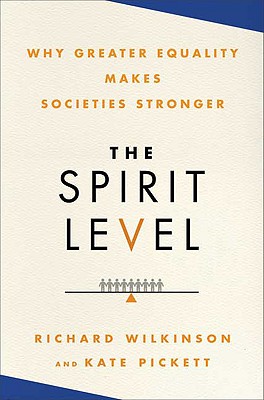
The Spirit LevelBy Richard Wilkinson and Kate Pickett
Why More Equal Societies Always Do Better
During the 1930s depression, it was noted that, on average, Public School pupils were several inches taller than those from state schools. The obvious inference was that their better economic situation was the cause. It was not clear, however, that most of society's ills stem from this gross inequality. This has been shown by these two internationally recognised social and medical scientists. As their conclusions are based on what they call more than fifty person-years of intense and detailed research (i.e. nearly thirty years each), those conclusions would be difficult to refute – unless of course the doubters were prepared to match their efforts.
The list of harmful effects is almost endless: ill-health, lack of community life, violence, drugs, obesity, mental health disorders, long working hours, big prison population. They painstakingly dissect all the intricate workings of our social system and expose its harmful effects, but they also suggest ways in which our 'broken society' may be mended.
They start by noting that, in the main, the populace accept their lot because they do not believe things can be seriously altered. "It's human nature" and we all "know" that "can't be changed," which reminds me of a wonderful speech by the hero of a Priestly play who has "seen the light" and wants to go and spread the word – yes – the dreaded S-word (socialism). "They'll tell you, you can't change human nature," he says,"but it's a lie. We've been changing human nature for thousands of years. But what you can't change is man's eternal desire to make this world a better place to live in."
The authors explain how they think this can be done... True, they seems to reject the idea of fundamental change, although what they do suggest is pretty far reaching. The Soviet attempt to develop a socialist alternative is dismissed with the usual references to inefficient central planning and Stalinist repression. Rather disappointing for this reviewer, considering the meticulous nature of the rest of their investigations. Nonetheless, a remarkably valuable and thought-provoking work which should be read by all who are concerned with human welfare and it's present deplorable state.